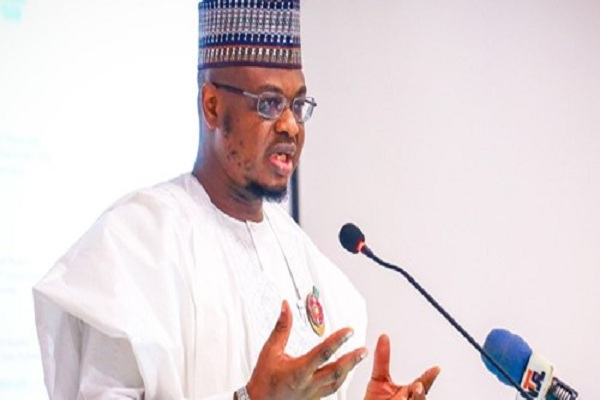Telecom
ICT Contribution of 17.92% to Nigeria’s GDP, Its Highest Ever – Pantami

Dr Isa Ali Ibrahim Pantami, minister of Communications and Digital Economy, said the Information and Communications Technology (ICT) has contributed 17.92 per cent to Nigeria’s Gross Domestic Product (GDP) its highest ever in the history of the nation.

Dr Isa Ali Ibrahim Pantami
Dr Pantami stated this in a statement signed by Femi Adeluyi, technical assistant, Information Technology to the Minister on Thursday in Abuja.
According to Pantami, we’re highly delighted to hear of the growth of the contribution of the Information and Communications Technology (ICT) sector to Nigeria’s Gross Domestic Product (GDP) in the second quarter of 2021 (Q2 2021).
“The National Bureau of Statistics (NBS) indicated this in the ‘Nigeria’s Gross Domestic Product Report’ for Q2 2021 released today, the 26th of August, 2021.
“It is noteworthy that the ICT sector contributed 17.92% to the total real GDP in Q2 2021, 20.54% higher than its contribution a year earlier and in the preceding quarter, in which it accounted for 14.91%.
“This is the highest contribution of ICT to the GDP and is truly unprecedented.
According to the NBS, “Nigeria’s GDP grew by 5.01%(year-on-year) in real terms in the second quarter of 2021, marking three consecutive quarters of growth following the negative growth rates recorded in the second and third quarters of 2020.
“The negative growth was triggered by COVID-19, not only in Nigeria but also globally. Even within that period, the ICT sector in Nigeria continued to experience positive growth.
“The oil sector contributed 7.42% to total real GDP in Q2 2021, down from figures recorded in the preceding quarter, where it contributed 9.25%. The non-oil sector grew by 6.74% and contributed 92.58% to the GDP”.
The Minister further noted that the growing contribution of the ICT sector to the GDP is as a result of the commitment of the administration of President Muhammadu Buhari, GCFR to the development of the digital economy.
He also attributed this to the 16 National Policies developed by the Ministry, the 1,667 projects and programmes, the large scale digital skills and general capacity building efforts, stakeholder engagement and creation of an enabling environment all played an important role in the achievement.
Pantami further stated that the support of President Muhammadu Buhari, contributed immensely to the impressive developments in the sector.
“The unprecedented contribution of ICT to Nigeria’s GDP can also be attributed to the dynamic and results-oriented leadership of the sector, which has been acknowledged and appreciated by a wide spectrum of the stakeholders in the sector, both locally and internationally.
“For example, Mr Houlin Zhao, the Secretary General of the International Telecommunications Union (ITU) commended us for Nigeria’s “accelerated digital transformation”.
“Similarly, the Chairman of the United States-Nigeria Council (USNC) also commended him for the “commitment to diversifying Nigeria’s great economy through digital technology and innovation.”
“The GDP Report has shown how critical the ICT sector is to the growth of our country’s digital economy and, by extension, the general economy,” he added.
The Honourable Minister also renewed calls to all sectors to take advantage of the Federal Government’s new focus on the digital economy to enable and improve their processes through the use of ICTs.
This he said would enhance the output of all the sectors of the economy and boost Nigeria’s GDP.
Telecom
MTN Nigeria Crowns Ayo Benzi Winner of Next Afrobeats Star

MTN Nigeria, in collaboration with ONErpm and Ultima Studios, has announced Ayodeji Benson, popularly known as Ayo Benzi, as the winner of the maiden edition of the Next Afrobeats Star reality show.

L-R: Onyinye Ikenna-Emeka, Chief Marketing Officer, MTN Nigeria; Ayodeji Benson, Winner, Next Afrobeats Star Reality Show (Season 1) and Emamoke Ogoro, General Manager, Brand and Communication, MTN Nigeria, at the grand finale of the Next Afrobeats Star Reality Show (Season 1), held at the Ultima Studios, Lekki, Lagos on Saturday, December 13, 2025.
The grand finale, held on Sunday night at Ultima Studios in Lekki, Lagos, marked the climax of a nationwide talent search that began in September with over 15,000 aspiring musicians.
After weeks of auditions, mentorship, and rigorous training, five finalists – Ayo Benzi, Dave Cash, Kaeko, Somto O’Laker, and Lucky Yay – battled for the top prize in a high-energy showcase of performance and artistry.
At the end of the electrifying contest, Ayo Benzi emerged victorious, securing a ₦150 million music deal. Dave Cash was named first runner-up with ₦100 million, while Kaeko, Somto O’Laker, and Lucky Yay received ₦75 million, ₦50 million, and ₦25 million respectively.
Throughout the season, contestants were mentored by leading Afrobeats producers Sarz, Puffy Tee, P Prime, and Andre Vibez. Benzi, who was part of Puffy Tee’s team, credited the mentorship programme for sharpening his craft and stage presence.
Speaking at the event, Onyinye Ikenna-Emeka, Chief Marketing Officer of MTN Nigeria, said the initiative reflects the company’s commitment to youth empowerment and cultural expression.
“The Next Afrobeats Star platform is about creating real opportunities for young Nigerians and giving their talent the structure, visibility, and support it deserves.
“Afrobeats continues to place Nigeria on the global cultural map, and MTN is proud to be enabling the next generation of artists who will take this sound even further,” she said.
She added that the finale was not just a competition but a celebration of growth and readiness for the global stage.
In his acceptance speech, Ayo Benzi described the victory as a defining moment in his career.
“A big thank you to MTN. From the audition days, the treatment MTN has given us has been amazing. God bless the brand,” he said.
The finale also featured guest performances by Afrobeats stars Iyanya and Bella Shmurda, adding glamour to the night and reinforcing the show’s connection to the wider music ecosystem.
With the successful conclusion of the season, MTN Nigeria and its partners reaffirmed their role in championing youth ambition, supporting creative industries, and shaping the future of Nigerian music through platforms that turn potential into opportunity.
Telecom
NCC Unveils Draft 5-Year Spectrum Roadmap, 60 GHz License-Exempt Guidelines to Boost Broadband, Innovation

Nigerian Communications Commission (NCC) has unveiled two pivotal regulatory draft documents aimed at reshaping Nigeria’s communications sector over the next five years and fast-tracking deployment of ultra-high-speed wireless technologies.

NCC
In a public notice dated December 19, 2025, and issued pursuant to its mandate under the Nigerian Communications Act (NCA) 2003, the Commission published the Draft 5-Year Spectrum Roadmap for the Communications Sector (2025–2030) and Draft Guidelines for the Use of the 60 GHz License-Exempt Band for Multi-Gigabit Wireless Systems.
Both documents are accessible on the NCC website for stakeholder review, with the roadmap outlining strategic spectrum planning, allocation, and management to optimise utilisation, support emerging technologies like 5G and IoT, expand broadband access, and align with global best practices.
The Spectrum Roadmap emphasises four core pillars: bridging the digital divide through low-band spectrum and satellite services, attracting investments via flexible licensing models, enhancing service quality with mid-band optimisation, and fostering innovation in areas such as direct-to-device connectivity and secondary spectrum trading.
It sets ambitious targets including universal 4G coverage nationwide, 50 per cent 5G penetration in state capitals, and average broadband speeds of 100 Mbps by 2030, while addressing rising data demand through band refarming and efficient management.
Complementing this, the 60 GHz Guidelines establish a license-exempt framework for the 57–66 GHz band, enabling multi-gigabit speeds up to 10 Gbps for short-range applications like WiGig, fixed wireless access, enterprise connectivity, urban broadband, and backhaul solutions.
The rules mandate NCC type approval for equipment, site registration for outdoor use, and interference mitigation measures, while prohibiting wide-area networks to safeguard primary users.
In line with Section 58 of the NCA 2003, NCC invites comments from industry operators, equipment manufacturers, consumer groups, and the public, with submissions due by Friday, January 16, 2025, via email to [email protected], [email protected], and [email protected].
The notice, signed by Mrs Nnenna Ukoha, Head of Public Affairs, stresses that stakeholder inputs will refine the frameworks to drive innovation, investment, competition, and sustainable growth in Nigeria’s telecoms ecosystem.
Telecom
NCC Grants 45 Days for Telecoms Firms to Fix Unapproved Shareholding Changes

Nigerian Communications Commission (NCC) has issued a public notice directing all its licensees that have effected changes exceeding ten percent (10%) in their shareholding structures without prior regulatory approval to immediately regularise such infractions.

NCC
In the notice published on the Commission’s website, www.ncc.gov.ng, the NCC said the directive was issued in exercise of its statutory powers under the Nigerian Communications Act, 2003.
According to the Commission, affected licensees are granted a 45-day grace period from the date of publication to regularise any unapproved changes in their shareholding structures that exceed the 10 per cent threshold.
The NCC clarified that no sanctions will be imposed during the 45-day window for any previous infractions relating to unapproved shareholding changes above the prescribed limit. However, it warned that appropriate sanctions will be enforced immediately after the expiration of the grace period against defaulting operators.
The sanctions, the Commission stated, will be applied in line with the Nigerian Communications (Enforcement Processes, etc.) Regulations, 2019.
The regulator further emphasised that the notice is issued pursuant to Regulations 41, 42 and 43 of the Licensing Regulations, 2019, which require licensees to obtain prior approval from the Commission before effecting significant changes in ownership or control.
Industry observers note that the directive underscores the NCC’s renewed focus on regulatory compliance, transparency, and corporate governance within Nigeria’s telecommunications sector.
Licensees have therefore been advised to promptly engage with the Commission to regularise their shareholding structures and avoid penalties once the grace period lapses.

 Telecom2 days ago
Telecom2 days agoGoogle Finally Allows Users to Change Gmail Address, Keeps Data and Services Intact

 News2 days ago
News2 days agoInsomniaQ Spotlights African Creativity in Lagos

 General News2 days ago
General News2 days agoT2 Backs Youth Excellence as NCBC Wins Bosun Tijani Foundation Basketball Tournament

 E-Financial1 day ago
E-Financial1 day agoNigeria’s N58.18trn Budget and Rising Cost of Deficit Governance

 Telecom1 day ago
Telecom1 day agoNnaemeka Ani – The Architect of ‘Code and Courage’

 Telecom1 day ago
Telecom1 day agoMTN Nigeria Appreciates Partners, Customers at Lagos Prestige Experience

 Telecom17 minutes ago
Telecom17 minutes agoNCC Unveils Draft 5-Year Spectrum Roadmap, 60 GHz License-Exempt Guidelines to Boost Broadband, Innovation

 Telecom17 minutes ago
Telecom17 minutes agoNCC Grants 45 Days for Telecoms Firms to Fix Unapproved Shareholding Changes





















